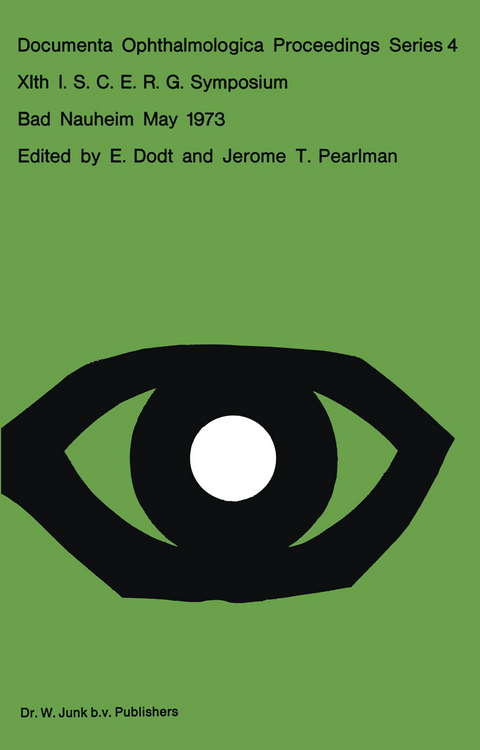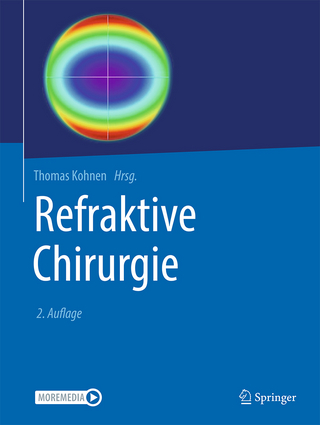
XIth I.S.C.E.R.G. Symposium
Kluwer Academic Publishers (Verlag)
978-90-6193-144-7 (ISBN)
Professor GOSTA KARPE GOSTA KARPE was born in Vadstena, Sweden, 1908. His medical education started in 1927 at the Karolinska Institute in Stockholm During his study he worked parttime in the department of physiology. KARPE served as a resident in the ophthalmological department of Serafiner lasarettet from 1937 till 1941. That year, the university eye clinic was transferred to the newly built Karolinska Sjukhuset, where KARPE became assistant-head of the out-patient department, and lecturer in ophthalmology. In 1949 he was appoin ted professor in ophthalmology at the Karolinska Institute and head of the department of ophthalmology at Karolinska Sjukhuset. KARPE received his doctor degree in 1945 upon completion of his thesis: 'The basis of clinical electroretinography'. This original work opened up a completely new field of clinical investigation. Soon Swedish and foreign pupils flocked into his department to study his new method, a technique at present accepted as an indispensable tool in ophthalmic practice. Since 1945 his work as well as that of his pupils have been devoted mainly to this field of research.
Gösta Karpe.- The concept ‘Receptive field’.- The rod outer segment, its pathology and clinical implications.- On cone dysfunctions.- Electroretinography of cone dysfunction with monochromatic light.- ERG recovery in rod-and cone dysfunction.- Differentiation of cone and rod responses in the human ERG by means of colour frequency characteristics.- Cone dark adaptation: Comparison of psychophysics and vector-retinography.- Analysis and synthesis of the scotopic ERG (rabbit).- The functional examination of the human photopic visual system with the aid of psychophysical flicker thresholds and ERG flicker responses.- Progressive generalized cone dysfunction.- Absent cone function (a survey of clinical cases).- Cone dystrophy with dominant inheritance. Part I: Clinical case histories.- Cone dystrophy with dominant inheritance. Part II: Special color vision tests.- On progressive cone dystrophy.- Monochromatic ERGs in a case of progressive cone dystrophy.- Halothane retards dark adaptation.- Electrophysiological tests in congenital stationary night-blindness with regard to the different types of inheritance.- Electro-ophthalmology of a family with X-Chromosomal recessive nyctalopia and myopia.- Psychophysical and VECP examination of a rod monochromat and a cone monochromat.- Achromatopsia with myopia in a genetic isolate.- Visual pigment kinetics and adaptation in Fundus Albipunctatus.- Effects of duration and intensity of illumination on the light induced change in the amplitude of the human electro-oculogram.- The steady state in EOG.- The foveal electro-oculogram.- A new method for d.c. registration of the human ERG at low and conventional stimulus intensities.- The electroretinogram — a reinterpretation of its basic components.- An unusual case of recurrenthypokalemia followed electroretinographically.- Cortical evoked responses from stimulation of various regions of the visual field.- Contribution of the central and the peripheral part of the retina to the VECP under photopic conditions.- Stimulus and visually evoked potential.- Visually evoked potential methods with clinical applications.- Luminance and color components in the VER.- Colour vision in Rhesus monkey, studied with subdurally implanted cortical electrodes.- Responses to spectral light stimuli recorded in tectum opticum of the frog.- Study of clinical interest of the visual evoked responses obtained by focal stimulation following the eye movements.- Contribution to objective perimetry by means of the VER.- A stimulator for electroretinotopography.- The human visual evoked response: interest and limits of its study in clinical practice.- The AVER in ophthalmology.- Pattern stimuli for clinical ERG.- Interest of monopolar leads in visual evoked responses of lateral homonymous hemianopsia.- Mean visual evoked potentials in hemianopsia.- A quantitative evaluation of the VECP in optic neuritis.- VECPs in patients with glaucoma.- ERGs and noise: detection probability, time and amplitude errors.- Coupled electrophysiological and colour fluorographic studies as a part of the anatomical diagnosis of retinopathies.- Examination under general anaesthesia of children with defective vision (1969–1972).- Complexity of PIII as manifested by light adaptation.- Mechanism of action of ?-hydroxylhexylpyridone-2 on the ERG.- ERG and diagnosis of encephalic death. Clinical findings and experimental data.- O2 dependence of the b-wave in the isolated perfused mammalian eye.- The fast ocular dipole oscillation.- A first electrical analog model of the ODM-oscillations.- SlowOcular Dipole Moment (ODM) Variation — a damped oscillation.- Thresholds of the oscillatory potentials in mice.- Thresholds of the oscillatory potentials of the human ERG.- The electroretinogram of albino and pigmented rabbits.- Retinal input and early development of the visual system.- ERG changes in the chicken reared in continuous illumination possible involvement of taurine.- The automated electrooculogram and its clinical uses.- Unilateral Retinopathia pigmentosa. Case report and histological findings.
| Erscheint lt. Verlag | 30.6.1974 |
|---|---|
| Reihe/Serie | Documenta Ophthalmologica Proceedings Series ; 4 |
| Zusatzinfo | 51 Illustrations, black and white; 526 p. 51 illus. With online files/update. |
| Verlagsort | Dordrecht |
| Sprache | englisch |
| Maße | 156 x 244 mm |
| Themenwelt | Medizin / Pharmazie ► Medizinische Fachgebiete ► Augenheilkunde |
| ISBN-10 | 90-6193-144-4 / 9061931444 |
| ISBN-13 | 978-90-6193-144-7 / 9789061931447 |
| Zustand | Neuware |
| Haben Sie eine Frage zum Produkt? |
aus dem Bereich


